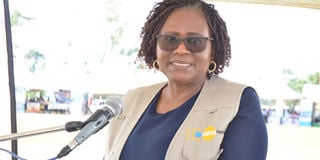Prime
Uganda marks World Population Day with call to action on child marriages

Ms Gift Malunga, the UNFPA Country representative in Uganda speaks during the celebrations in Arua District. Photo by MIKE SEBALU
What you need to know:
In a speech delivered at the national celebrations held in Arua District, President Yoweri Museveni addressed a pressing issue that has far-reaching consequences for the country's development: child marriages.
On July 7, 2024, Uganda joined the rest of the world to commemorate World Population Day, a day set aside to raise awareness about population growth and its impact on development.
In his message, read by National Population Council (NPC) Chairperson Prof. Fred Wabwire at the national celebrations held in Arua District, President Yoweri Museveni addressed a pressing issue that has far-reaching consequences for the country's development: child marriages.
With Uganda's population projected to continue growing, the President's message emphasized the importance of investing in education, health, and skills development for young people, and urged leaders to sensitize parents to keep their children in school and take advantage of government programs aimed at improving livelihoods.
President Museveni urged leaders to sensitize parents to keep their children in school and utilize government programs like the Parish Development Model (PDM) to enhance their livelihoods.
"I urge all Ugandans to take advantage of government programs in education, health, skilling, and wealth creation. These programs are crucial in addressing poverty-related challenges, including teenage pregnancies and child marriages. We cannot continue to condone the marriage of young girls who should be in school. Child marriage is a significant obstacle to girls' education, and we must reject all practices that perpetuate it, including teenage pregnancy, gender-based violence, drug abuse, and school dropouts. Let us work together to create a brighter future for our children," it read.
The President's concern was prompted by Eruba Village Chairperson Mr Bosco Endrengi's speech, which shed light on the alarming issues faced by youth in his village, including drug abuse, child marriages, and teenage pregnancies.
According to the United Nations Population Fund (UNFPA), child marriage is still common in Uganda, with the highest prevalence in the Northern region at 59%, followed by the Western region at 58%, the Eastern region at 52%, East Central at 52%, and West Nile at 50%.
Speaking at the same event, UNFPA Country Representative in Uganda, Ms Gift Malunga, commended the government of Uganda for prioritizing data-driven policies and programs, including the recently concluded National Housing and Population Census 2024.
"Uganda's inaugural digital National Housing and Population Census in May, with preliminary results already released, demonstrates the country's bold step towards data-driven governance and evidence-informed development," she said.
She highlighted advancements in data collection and technology, which have provided comprehensive information for measuring global health growth. Citing the 2022 demographic and health survey, she noted significant progress in maternal and child health, including a reduction in maternal mortality from 336 to 189 deaths per 100,000 live births and a 9% decrease in neonatal mortality.
With 73.2% of the population below 30 years, Ms Malunga urged the government to invest in education, health, and skills for young people, analyze census results by age category, and prioritize interventions to address population needs and create meaningful change.
Arua District Local Government Chairperson, Mr Alfred Ukuonzi, highlighted the major challenges hindering service delivery in the West Nile sub-region. He cited inadequate access to safe water, electricity, and health facilities as the main obstacles.
Specifically, he noted that Arua district's water coverage stands at 54%, far below the national target of 80%, and power coverage is below 27%, leaving many skilled youths unemployed.
Furthermore, the district has only six health facilities, most at the Health Centre III level, with no Health Centre IV or district hospital, making healthcare access a significant challenge. Mr Ukuonzi also advocated for the creation of new administrative units, citing the large size of villages, parishes, and sub-counties, which hinders service delivery.
He reminded the President of the long-standing pledges made 35 years ago, including iron sheets for schools, tractors, and heifer cattle for farmers, which remain unfulfilled.
Vura Sub County Chairperson, Mr Joel Pariyo, urged the government to conduct a supplementary census in Arua District, as a significant number of households were missed during the recently concluded National Population and Housing Census 2024.
"In the recent census exercise, West Nile emerged as the sub-region with the highest population in the country. However, due to planning gaps, a significant number of our households were missed. I implore you, as the chairperson of the board, to assure us that those who were left out will be included in a supplementary count, ensuring that our sub-regions accurate population figures are reflected."
According to the preliminary 2024 census results, districts in Northern Uganda, particularly in West Nile, have shown significant population growth.
This year's World Population Day celebrations, held at Eruba Primary School, focused on the theme "Celebrating the Past, Planning for the Future: Towards Meeting the Needs for All", highlighting the importance of addressing population growth and development challenges.




